News
UK deal to hand over Chagos Islands criticised over lack of say for Chagossians
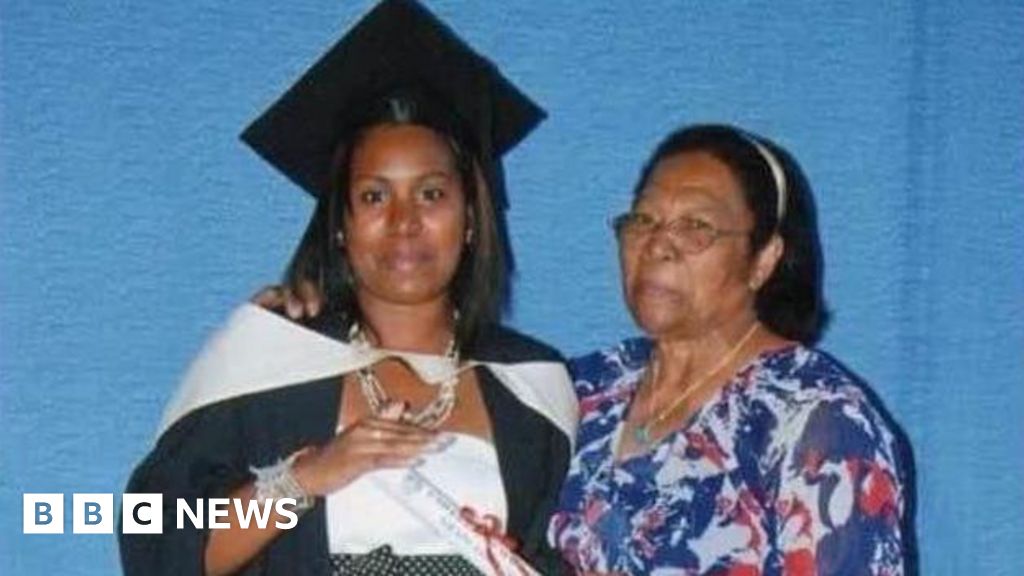
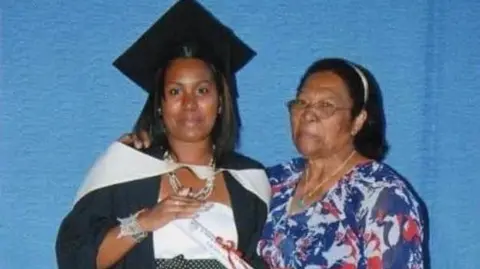 Pascalina Nellan
Pascalina NellanPeople with roots in the Chagos Islands have criticised what they called their “exclusion” from negotiations leading to the UK government’s deal to give up its sovereignty of the region.
The remote but strategically important cluster of islands in the Indian Ocean is set to be handed to Mauritius after more than half a century.
Some Chagossians the BBC spoke to broadly welcomed the deal, but many said indigenous people had been repeatedly refused an opportunity to take part in talks.
The Foreign Office said the interests of the Chagossian community had been “an important part of the negotiations”.
Pascalina Nellan, whose grandmother was born on a key island in the region – Diego Garcia, said the deal amounted to a “backstabbing” by the UK government.
Ms Nellan was born in Mauritius, where her grandmother resettled after being removed from Diego Garcia to make way for a US Air Force base.
Two years ago she moved to the UK, where she has been calling for Chagossian involvement in the deal over the territory.
“Every time we made a request to be heard we have been excluded,” she said, claiming UK officials said the Chagossian community could not be involved in negotiations between the two countries.
“Today, again, we’ve been excluded,” the 34-year-old postgraduate student told the BBC.
“We need to respect the rights of indigenous people.”
Ms Nellan said she would like to go back to the islands, but not under Mauritius’ control.
“Our right to self-determination – whether we want to be British citizens or Mauritian citizens at all – has been stripped today,” she said.
Frankie Bontemps, a second generation Chagossian in the UK, told the BBC that he felt “betrayed” and “angry” on Thursday because “Chagossians have never been involved” in the negotiations.
“We remain powerless and voiceless in determining our own future”, he said, and called for the full inclusion of Chagossians in drafting the treaty.
 Steeve Bancal
Steeve BancalSteeve Bancal, a trainee social worker from Sussex, was positive about the deal.
He said Mauritius was more likely to put resettlement plans in place for Chagossians than the UK, who had “done nothing” for the community.
He expressed hope to return to the islands with his mother, who was also removed from Diego Garcia. She resettled in Mauritius, where Mr Bancal was born.
Mr Bancal said it would be a “dream come true” for his mother, 74, to return to Diego Garcia.
However, he also criticised the negotiations, saying they happened “behind closed doors”.
“None of us were told what was happening. It’s unfair on us,” he said.
“It’s our heritage – we should have had one or two people in the room.
“I don’t think the UK government trusts us.”
 Isabelle Charlot
Isabelle CharlotIsabelle Charlot was born in Mauritius to Chagossian parents, and has lived in the UK – where she is the chairperson of the Chagos Islanders Movement – for 19 years.
She said she now hoped to return to the archipelago, from which Britain forcibly removed more than 1,000 islanders between 1965 and 1973 after gaining control of the territory.
“That is what my family and I have been waiting for,” Ms Charlot told the BBC.
She said she welcomed the deal as a step toward “reclaiming [her] identity, heritage and homeland”, all of which had been “robbed” from her.
“I [knew] that the Labour government would want to right the historical wrongs and respect the international law,” she said.
‘Genuinely historic’
Human Rights Watch (HRW) called for the Chagossians to be consulted on the deal.
Responding to the UK government’s announcement, Clive Baldwin, senior legal advisor at HRW, said: “It does not guarantee that the Chagossians will return to their homeland, appears to explicitly ban them from the largest island, Diego Garcia, for another century, and does not mention the reparations they are all owed to rebuild their future.”
Mr Baldwin called for meaningful consultations with the Chagossians.
He said unless this happens, the UK, US and now Mauritius would be be responsible for “a still ongoing colonial crime”.
 ALAMY
ALAMYJonathan Powell, the UK’s Special Envoy for British Indian Ocean Territory negotiations, said on Thursday that Britain’s past treatment of the Chagossians was “shameful”.
But he called the agreement, reached after 11 rounds of negotiations, “genuinely historic”.
He said he could not guarantee whether Chagossians would be able to return to the islands, since they were to become Mauritian territory, but that the UK was committed to “help with resettlements if that’s possible”.
The UK government said it will also provide a package of financial support to Mauritius, including annual payments and infrastructure investment.
An FCDO spokesperson said: “This is a bilateral agreement between the UK and Mauritius.”
“We are mindful that the future of the islands is an important issue for the Chagossian community. Their interests have been an important part of the negotiations.”
Money
‘Legendary’ food shop which starred in Channel 4 show to close its doors after 50 years

A beloved pie shop that featured in a Channel 4 show is closing after 50 years of business.
Potts Pies in Lancaster first opened in 1973 and caught the attention of the Hairy Bikers.
The owner, Donna Crossley, who started working at the shop in 1992, left customers shocked by the news.
“I did not ever think I’d be writing this, but it’s time to hang my apron up,” she wrote in an emotional Facebook post.
“I would like to thank each and every one of you, it’s had his ups and downs, mainly ups.
“It’s not been easy over the last few years as some of you know. I will leave here with my head held high and be proud of what I’ve done,” she added.
Gutted by the news, locals praised Donna and her team.
“End of an era, lots of amazing memories and generations of workers and customers,” one wrote.
“Potts Pies will always have a place in my heart, my grandad used to work there years ago,” said another.
“I would like to wish the new owner all the best and good luck for what you turn it into,” echoed a third.
Donna said the highlight of her time at the shop was the day the late Dave Myers and Si King paid a visit.
Potts Pies was launched by Joe and Vena Potts in 1973 before it was taken over by the Walsh family in 1988.
It expanded and had shops in Morecambe, Toorisholme, Bare and Bolton le-Sands.
The business struggled in the last few years and Donna only employed two staff members who made pies twice a week.
The shop has been sold to new owners, but it’s not known what they plan on doing with the space.
News
Guardian and Observer staff vote for possible strike over Tortoise sale plan
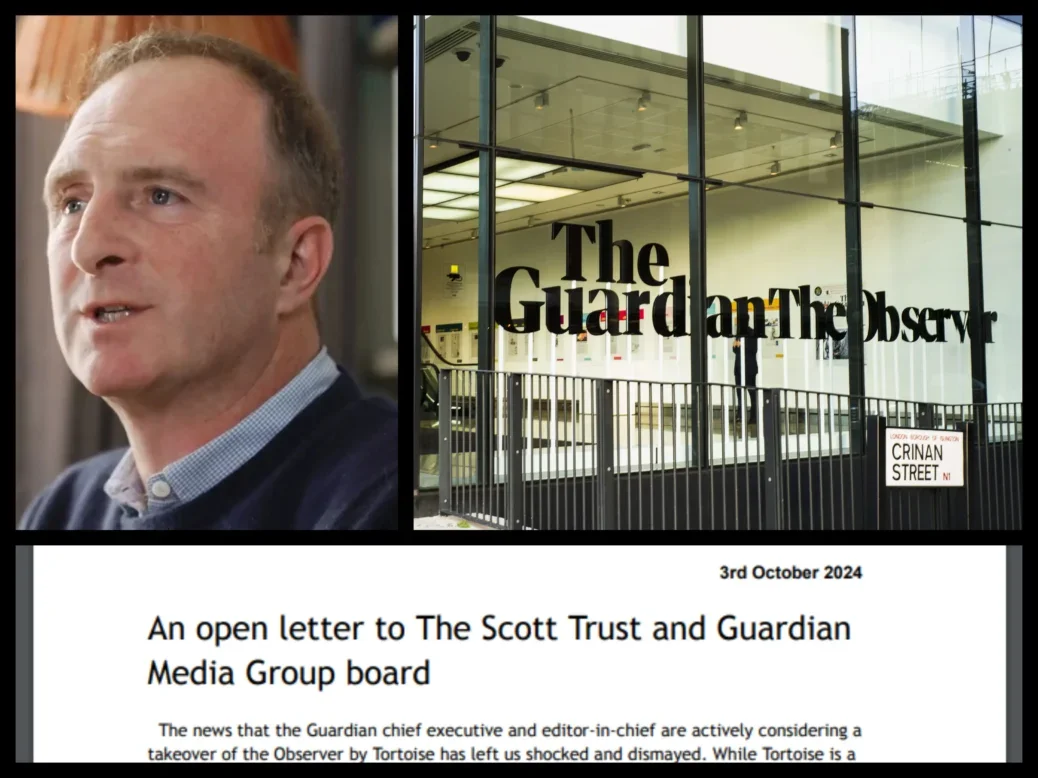
Guardian and Observer journalists have agreed they may take industrial action in protest at plans to sell The Observer to Tortoise Media.
The move comes as a group of prominent cultural figures, many of whom have contributed to The Observer, submitted an open letter to Press Gazette blasting the possible sale, saying it is “disastrous” and values the paper “at or near zero”.
Up to 400 staff attended a meeting of the combined Guardian and Observer NUJ chapel on Thursday (3 October) where strong feelings were aired opposing the deal.
The packed mandatory meeting went on for more than an hour and was a mixture of in-person and via Google Meet.
Two votes were passed unanimously: to put the matter “into dispute” and “if necessary” to hold “industrial action”.
The Guardian and Observer titles are owned by the Scott Trust, whose purpose is “to secure the financial and editorial independence of the Guardian in perpetuity…remaining faithful to its liberal tradition”.
Content from our partners
Press Gazette understands staff complained about what was seen as a failure of the Trust to protect plural liberal journalism in tough times. Some spoke about a sense of “betrayal” amongst Observer journalists who have worked at the company for 30 years or more.
There was also concern raised that readers who have made financial donations in order to support Observer journalism will feel misled if the title is sold.
Mention was also made of The Guardian’s “Not For Sale” marketing campaign last year which emphasised the title’s editorial independence. Some staff at the meeting said it was ironic that in fact The Observer did seem to be for sale and apparently at a nominal price.
Guardian Media Group announced on 17 September that it was in a period of exclusive negotiations to sell The Observer to Tortoise Media, which is mainly a podcast publisher.
Tortoise founder and main shareholder James Harding has not yet revealed who is financially backing The Observer bid which is said to include £25m of investment over five years (over and above the title’s running costs). But he has assured staff that the deal will be a boost to liberal journalism.
Around 70 Observer staff would transfer over with the deal.
Both the Scott Trust and Guardian management appear keen to do the deal, with chief executive Anna Bateson describing it as “an exciting opportunity” to build The Observer and “allow The Guardian to focus on its growth strategy”.
Press Gazette understands that Harding has met with some Observer staff but there are still widespread concerns about job security if the deal goes through. Guardian and Observer journalists currently benefit from an NUJ house agreement which includes a no compulsory redundancies promise.
A Guardian spokesperson said: “We are in negotiations about the offer from Tortoise Media to buy the Observer and we are grateful to everyone who has fed their thoughts into discussions so far. One of the reasons for being transparent about the offer was so that we could openly engage with Observer staff. There is still a lot of information to work through and we will continue to discuss internally.”
Prominent cultural figures blast Tortoise bid for The Observer in open letter
Also on Thursday a group of more than 70 prominent UK cultural figures including Oscar-winning actors and directors and some of the UK’s leading novelists and playwrights addressed an open letter to the Scott Trust and Guardian Media Group describing the possible deal as “a betrayal” and calling on them “to reject this ill-considered offer at once”.
Among the signatories were actor Ralph Fiennes, musician and broadcaster Jarvis Cocker, broadcaster Carole Vorderman, playwright Tom Stoppard and actress Lesley Manville.
The letter in full:
The news that the Guardian chief executive and editor-in-chief are actively considering a takeover of the Observer by Tortoise has left us shocked and dismayed. While Tortoise is a respected media outlet, we believe that the move would be disastrous for the world’s oldest Sunday newspaper and its journalists, for the Guardian and for liberal journalism.
While figures of £100m are being bid for other publications, this poorly funded approach sets the value of the Observer at or near zero. The proposal also envisages moving it from a resilient and well-funded newspaper publisher to a small, loss-making digital startup whose funding for the takeover would in all likelihood come from private equity.
Is Tortoise really committed to continuing with the Observer in print? If it were to discontinue the newspaper or if the business were to fail, the Guardian’s editor-in-chief and chief executive and the Scott Trust, which owns Guardian Media Group, would go down in history as being responsible for the demise of the last liberal Sunday newspaper.
The immediate financial threat to the newspaper’s journalism, and its staff, is clear. Even if it were to survive, the Observer would be much changed – cut off from its network of foreign correspondents, sports reporters and business journalists. Leading writers, familiar to the paper’s readers for years, would be gone. Guardian supporters would lose the Observer’s voice and presence on the Guardian website and app. And if, as seems inevitable, the Observer’s politics, arts and culture coverage is to go behind a paywall, then its unique voice in Britain’s national conversation will be muted.
The Scott Trust, the Observer’s parent for 30 years, prides itself on providing a home for journalism free from the taint of corporate interests. Its engagement with this offer, however, suggests that the Observer’s award-winning reporting is something that the organisation, with its £1.3bn endowment, is no longer interested in protecting.
We call on Guardian Media Group and the Scott Trust to reject this ill-considered offer at once, and to retain the Observer as a key element of its seven-day print and online operation. Failure to do so would be a betrayal of the Observer, its staff and its readers.
Yours sincerely,
Monica Ali (author)
Joan Bakewell (journalist and peer)
Julian Barnes (author)
Mary Beard (classicist and broadcaster)
Frank Cottrell Boyce (screenwriter and novelist)
Rosie Boycott (journalist and peer)
Asa Butterfield (actor)
Dorothy Byrne (former television news executive)
Simon Callow (actor)
Bridget Christie (comedian)
Eliza Clark (author)
Jarvis Cocker (musician and broadcaster)
Jonathan Coe (author)
Richard Coles (author and priest)
Stephen Daldry (director and producer)
Janie Dee (actress)
Jeremy Deller (artist)
Clint Dyer (director and actor)
Richard Eyre (director)
Ralph Fiennes (actor and producer)
Hugh Fearnley-Whittingstall (chef and broadcaster)
Nicole Flattery (author)
Michael Frayn (playwright and author)
Mark Gatiss (actor and director)
Bobby Gillespie (musician)
Howard Goodall (composer)
Hugh Grant (actor)
Colin Greenwood (musician)
Philippa Gregory (author)
Sheila Hancock (actress)
David Hare (playwright and director)
Robert Harris (author)
Lord Peter Hennessy (historian and peer)
Billy Howle (actor)
Toby Jones (actor)
Asif Kapadia (filmmaker)
Jackie Kay (poet and author)
Helena Kennedy (barrister and peer)
Peter Kosminsky (writer and director)
David Kynaston (historian)
Duncan Kenworthy OBE (producer)
Daisy Lafarge (author and poet)
David Lan (playwright)
Dame Hermione Lee (biographer and academic)
Anton Lesser (actor)
Adrian Lester (actor and director)
Damian Lewis (actor)
Joe Lycett (comedian)
Caroline Lucas (politician)
Lesley Manville (actress)
Robert McCrum (author)
David Morrissey (actor and fiilmmaker)
Ian McEwan (author and screenwriter)
Robert Macfarlane (author and academic)
Sophie Mackintosh (author)
Sienna Miller (actress)
Abi Morgan (playwright and screenwriter)
Michael Morpurgo (author)
Mike Newell (director)
Bill Nighy (actor)
Megan Nolan (author)
James O’Brien (broadcaster)
Mark O’Connell (writer)
Andi Oliver (chef)
Michael Ondaatje (poet and writer)
Richard Ovenden (librarian and author)
Chris Packham (naturalist and broadcaster)
Pawel Pawlikowski (filmmaker)
Maxine Peake (actress)
Alistair Petrie (actor)
Jonathan Pryce (actor)
Philip Pullman (author)
Steve Punt (comedian)
Mark Rylance (actor)
Michael Rosen (author)
Dominic Savage (director)
Tom Shakespeare (sociologist)
Lemn Sissay (author and broadcaster)
Gillian Slovo (author)
Tom Stoppard (playwright and screenwriter)
Olivia Sudjic (author)
Wolfgang Tilmans (photographer)
Carol Vorderman (broadcaster)
Harriet Walter (actress)
John Ware (journalist)
Email pged@pressgazette.co.uk to point out mistakes, provide story tips or send in a letter for publication on our “Letters Page” blog
Business
As communist China turns 75 can Xi fix its economy?

 Getty Images
Getty ImagesAs China prepared to celebrate its Golden Week holiday and mark the 75th anniversary of the People’s Republic, the ruling Communist Party rolled out a raft of measures aimed at boosting its ailing economy.
The plans included help for the country’s crisis-hit property industry, support for the stock market, cash handouts for the poor and more government spending.
Shares in mainland China and Hong Kong chalked up record gains after the announcements.
But economists warn the policies may not be enough to fix China’s economic problems.
Some of the new measures announced by the People’s Bank of China (PBOC) on 24 September took direct aim at the country’s beaten-down stock market.
The new tools included funding worth 800bn yuan ($114bn; £85.6bn) that can be borrowed by insurers, brokers and asset managers to buy shares.
Governor, Pan Gongsheng, also said the central bank would offer support to listed companies that want to buy back their own shares and announced plans to lower borrowing costs, and allow banks to increase their lending.
Just two days after the PBOC’s announcement, Xi Jinping chaired a surprise economy-focused meeting of the country’s top leaders, known as the Politburo.
Officials promised to intensify government spending aimed to support the economy.
On Monday, the day before China headed off for a weeklong holiday, the benchmark Shanghai Composite Index jumped by more than 8%, in its best day since the 2008 global financial crisis. The move capped off a five-day rally that saw the index jump by 20%.
The following day, with markets closed on the mainland, the Hang Seng in Hong Kong rose by over 6%.
“Investors loved the announcements”, China analyst, Bill Bishop said.
While investors may have been popping champagne corks, Mr Xi has deeper issues to tackle.
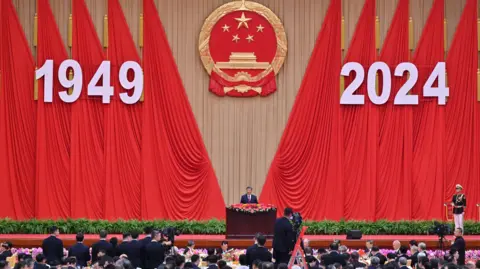 Getty Images
Getty ImagesThe People’s Republic marking its 75th anniversary means it has been in existence longer than the only other major communist sate – the Soviet Union – which collapsed 74 years after its founding.
“Avoiding the fate of the Soviet Union has long been a key concern for China’s leaders,” said Alfred Wu, an associate professor at the Lee Kuan Yew School of Public Policy in Singapore.
At the forefront of officials’ minds will be boosting confidence in the broader economy amid growing concerns that it may miss its own 5% annual growth target.
“In China targets must be met, by any means necessary,” said Yuen Yuen Ang, professor of political economy at Johns Hopkins University.
“The leadership worries that failing to meet them in 2024 will worsen a downward spiral of slow growth and low confidence.”
One of the main drags on the world’s second-largest economy has been the downturn in the country’s property market which began three years ago.
Aside from policies aimed at boosting stocks, the recently unveiled stimulus package also targeted the real estate industry.
It includes measures to increase bank lending, mortgage rate cuts and lower minimum down payments for second-home buyers.
But there’s scepticism that such moves are enough to shore up the housing market.
“Those measures are welcome but unlikely to shift the needle much in isolation,” said Harry Murphy Cruise, an economist at Moody’s Analytics.
“China’s weakness stems from a crisis of confidence, not one of credit; firms and families don’t want to borrow, regardless of how cheap it is to do so.”
At the Politburo session, leaders vowed to go beyond the interest rate cuts and tap government funds to boost economic growth.
However, beyond setting priorities like stabilising the property market, supporting consumption and boosting employment, the officials offered little in the way of details about the size and scope of government spending.
“Should the fiscal stimulus fall short of market expectations, investors could be disappointed,” warned Qian Wang, chief economist for the Asia Pacific region at Vanguard.
“In addition, cyclical policy stimulus does not fix the structural problems,” Ms Wang noted, hinting that without deeper reforms the problems China’s economy face will not go away.
Economists see tackling entrenched problems in the real estate market as key to fixing the broader economy.
Property is the biggest investment most families will make and falling house prices have helped undermined consumer confidence.
“Ensuring the delivery of pre-sold but unfinished homes would be key,” said a note from Sophie Altermatt, an economist with Julius Baer.
“In order to increase domestic consumption on a sustainable basis, fiscal support for household incomes needs to go beyond one-off transfers and rather come through improved pension and social security systems.”
 Getty Images
Getty ImagesOn the day of the 75th anniversary, an editorial in the state-controlled newspaper, People’s Daily, struck an optimistic tone, recognising that “while the journey ahead remains challenging, the future is promising”.
According to the article, concepts created by President Xi such as “high-quality development” and “new productive forces” are key to unlocking that path to a better future.
The emphasis on those ideas reflects Xi’s push to switch from the fast drivers of growth in the past such as property and infrastructure investment, while trying to develop a more balanced economy based on high-end industries.
The challenge China faces, according to Ms Ang, is that the “old and the new economies are deeply intertwined; if the old economy falters too quickly, it will inevitably hinder the rise of the new”.
“This is what the leadership has come to realise and is responding to.”
Money
Two big name chains bring back festive favourites to all stores including Terry’s Chocolate Orange treat and mince pies
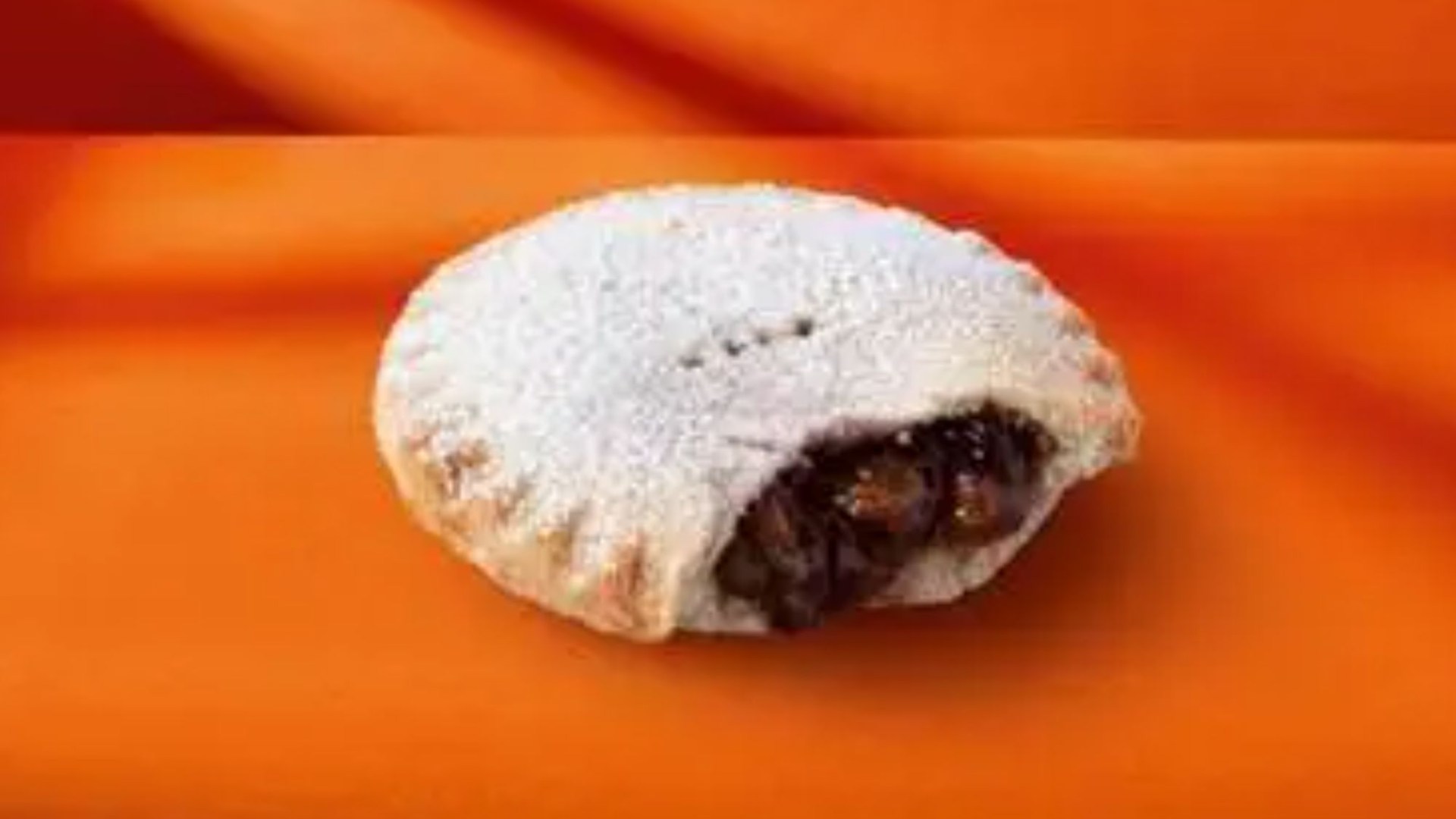
TWO huge chains have already started getting into the festive spirit.
Christmas favourites will be returning to menus at Costa Coffee and Greggs.
The coffee chain will be serving up their much-loved Terry’s Chocolate Orange Muffin, while Greggs will be dishing out the Sweet Mince pies.
They are following in the footsteps of supermarkets which have already started stocking shelves with festive food.
The wider Christmas menus will be rolled out later in the year.
Costa Coffee
The coffee shop is bringing back it’s own spin on the humble, yet mouthwatering, mince pie.
The Mince Tart is gluten-free and suitable for vegans and looks almost too good to eat.
Adorned with a pastry star and a sprinkle of icing sugar, the slice is the perfect treat to accompany a frothy coffee.
For those who love a classic, the traditional All Butter Mince Pie has also returned to Costa.
The beloved Terry’s Chocolate Orange Muffin is perfect for chocolate lovers, featuring a rich chocolate and orange muffin filled with sauce in the same flavour.
The sweet treat is topped with a Terry’s segment.
Greggs
The best way to kick off the start of the festive season is undoubtedly with a Greggs Sweet Mince Pie, which fans can indulge in from just 65p per pie.
For those looking to spread the festive cheer with their friends and family, a pack of six Sweet Mince Pies is available from only £2.25.
Vegan lovers of Greggs can also savour the festive favourite, as the vegan-friendly recipe consists of a crumbly shortcrust pastry, filled with a sweet mincemeat made from vine fruits, Bramley apple, candied orange and lemon peel.
For those of you who aren’t quite ready for Christmas just yet, Greggs has launched its Halloween range.
Fans can enjoy the festive and Halloween feels with a Sweet and Hot Drink Deal, pairing one of the new sweet menu items with a hot drink from just £2.85.
The new Pumpkin biscuit, a ginger biscuit coated in Fairtrade milk chocolate, is available from just £1.25.
The Spooky Bun, a vanilla flavour fairy bun dipped in fondant icing and topped with spine-chilling sugar decorations is also available from only £1.00.
For Greggs fans organising feasts for friends and family this Halloween, the Spooky Bun is also available as a pack of four from £3.15.
This comes after Sainsbury’s shoppers were shocked to find mince pies on sale in early September.
The gobsmacked customer wrote in the caption: “Stock up on your mince pies (take in Sainsbury’s a few days ago, so it was actually August!!!!).”
Another shopper who stumbled upon the Christmas treats in the major supermarket also took to X, and wrote: “On Sept 1 I walked into my local Sainsbury and what did I see on the shelves?
Tesco’s Christmas range has been slowly making its way into supermarkets and, with the festive season now on the horizon with under 100 days to go, the goods will soon be available at all of its 4,000 branches.
ASDA also unveiled its Christmas menu and customers can snap up spiced rum mince pies and parmesan and truffle pigs in blankets.
How to save money eating out
THERE are a number of ways that you can save money when eating out. Here’s how:
Discount codes – Check sites like Sun Vouchers or VoucherCodes for any discount codes you can use to get money off your order.
Tastecard – This is a members club where you pay to have access to discounts worth up to 50 per cent off at thousands of restaurants. It costs £4.99 a month or £34.99 for the year.
Loyalty schemes – Some restaurants will reward you with discounts or a free meal if you register with their loyalty scheme, such as Nando’s where you can collect a stamp with every visit. Some chains like Pizza Express will send you discounts for special occasions, such as your birthday, if you sign up to their newsletter.
Voucher schemes – Look out for voucher schemes offered by third party firms, such as Meerkat Meals. If you compare and buy a product through CompareTheMarket.com then you’ll be rewarded with access to the discount scheme. You’ll get 2 for 1 meals at certain restaurants through Sunday to Thursday.
Student discounts – If you’re in full-time education or a member of the National Students Union then you may be able to get a discount of up to 15 per cent off the bill. It’s always worth asking before you place your order.
For the first time ever, Asda has launched its first signature flavour – brown butter and spiced dark rum.
The flavour runs through a number of the festive food items ,including brown butter and spice dark rum mince pies and a slow cooked turkey with dark rum and brown butter stuffing.
There’s something for all palates and preferences too, with 57 new vegan and 35 new free from products included in the range.
Customers will be able to pick up no-meat turkeys, mushroom pigs in blankets and smoky aubergine bacon.
News
‘Blacks for Trump’ and Pennsylvania progressives play for undecided voters

As the 2024 presidential election enters its final month, a clear result has yet to materialize. Both parties are campaigning for undecided votes, and making some possibly unconventional choices along the way. Taya Graham reports from Baltimore and the suburbs of Lancaster, PA for The Real News, where conservatives and progressives alike are making a play for key swing voters.
Videography / Post-Production: Stephen Janis
Transcript
Taya Graham: This is Taya Graham for The Real News Network in Baltimore City, Maryland. I’m standing in a parking lot in Baltimore where just last week the so-called Blacks for Trump bus appeared, hoping to change hearts and minds in a very blue state. It’s one of many efforts to sway the precious handful of undecided voters in an election that many say is too close to call.
So we went on the ground from Baltimore to Pennsylvania to document two radically different approaches to picking up votes in otherwise hostile territory.
As the election looms over a bitterly divided partisan landscape, parties on both sides are pushing to make gains in otherwise unfriendly territory. Last week, Black Republicans visited deep blue Baltimore city on a so-called More Money with Trump bus tour. While attendance was low, confidence was not.
Diante Johnson: Baltimore is not an area that’s going conservative. The media has asked, why are we here? We can take Baltimore and with people like Kim Klacik, we will take Baltimore [crowd cheers].
Taya Graham: Kimberly Klacik, candidate for the state’s second congressional district in Maryland, said her party was reaching out to Black voters. Her argument? Democrats take them for granted.
What exactly are we seeing here? I’m not with her, the Black voters for Trump. What is this bus?
Kim Klacik: Yeah, so President Trump and of course VCF, they’re all in town today, just visiting areas like here, Morgan State University, just letting these students know that there is an option. You don’t have to vote for the leaning left Kamala, you don’t have to vote for this administration again. You can vote for change, which would be President Trump in this situation.
Speaker 1: Challenge them on the, he’s a racist. What does that mean? Tell me, what do you mean? He’s a misogynist. What does that have to do about good policies, effective policies that work for our country?
Taya Graham: Others said conservative ideas appeal to Black voters, even though they vote disproportionately Democrat.
Speaker 2: We stopped here in front of a grocery store in a targeted community because we know that inflation is high. We know that people are struggling to put food on the table for their families.
Taya Graham: The stakes are unusually high in Maryland. There, a former popular Republican governor, Larry Hogan, is running for a Senate seat that has been in Democratic hands for decades. His opponent, former Prince George’s County Executive Angela Alsobrooks, has been touting Hogan’s ties to Trump, but polls show the race is tight.
Meanwhile, in Pennsylvania, a different approach. At a community center, Lancaster Stands Up is organizing in the critical swing state that most agree could decide the presidential election. The nonpartisan group focuses on issues supporting candidates that back their policies. That means affordable housing, a living wage, and reproductive freedom.
Lindsay: So we’re a nonpartisan organization. So our goal is really to just support candidates both locally and on the national level that represent our values. So our members vote on local candidates, and then once we endorse them, we like to offer support through things like canvassing, phone banking, hosting meet and greets, things like that.
David Miller-Glick: We definitely do skew more towards Democrat than Republican. We tend to have a lot of problems with Republicans on labor rights and how they don’t really support workers.
Speaker 3: So we are running IE phones for Harris and Wallace because originally, we weren’t going to do anything when Biden was going to be this presidential candidate. But now that it’s Harris, we feel like she’s someone that we’ll be able to organize with and potentially work with in DC.
Taya Graham: Today, they were preparing people for door knocking, hoping that one-on-one encounters can change minds.
But just down the road in Lititz, a divided town shows changing minds won’t be easy.
Speaker 4: It’s a very polarizing time right now.
Taya Graham: Passions were so high that one resident we spoke to says he avoids talking about politics altogether.
Speaker 4: If you want to stay friendly with people, you don’t talk about politics. That’s the bottom line. Nobody’s getting convinced, and that includes my family. I don’t agree with my kids.
Taya Graham: Nevertheless, the people who did want to talk on the record about their choices were adamant.
May I ask who you’re voting for?
Speaker 5: Kamala Harris, and I just don’t like his politics and do not like what he would like to see, which is the United States to become a dictatorship.
Taya Graham: Phyllis, can you tell me if you’ve decided that you’re going to vote?
Phyllis: Yes, I have decided. Trump.
Taya Graham: Can you share with me what policies have inspired you to, if there’s anything in particular that really stands out to you as why you’re voting for him, I assume for the second time?
Phyllis: Just overall, because I don’t like who’s running against him.
Taya Graham: Is it the policies or the person you don’t like?
Phyllis: Policies and the person.
Taya Graham: This is Taya Graham and Stephen Janis for The Real News Network, election coverage 2024.
Related
Business
Keir Starmer stops taking donations for clothes
‘He’s started buying his own clothes’
-

 Womens Workouts1 week ago
Womens Workouts1 week ago3 Day Full Body Women’s Dumbbell Only Workout
-

 Science & Environment2 weeks ago
Science & Environment2 weeks agoHow to unsnarl a tangle of threads, according to physics
-

 Technology2 weeks ago
Technology2 weeks agoWould-be reality TV contestants ‘not looking real’
-

 Science & Environment2 weeks ago
Science & Environment2 weeks ago‘Running of the bulls’ festival crowds move like charged particles
-

 Science & Environment2 weeks ago
Science & Environment2 weeks agoHyperelastic gel is one of the stretchiest materials known to science
-

 Science & Environment2 weeks ago
Science & Environment2 weeks agoMaxwell’s demon charges quantum batteries inside of a quantum computer
-

 News2 weeks ago
News2 weeks agoOur millionaire neighbour blocks us from using public footpath & screams at us in street.. it’s like living in a WARZONE – WordupNews
-

 Science & Environment2 weeks ago
Science & Environment2 weeks agoHow to wrap your mind around the real multiverse
-

 Science & Environment2 weeks ago
Science & Environment2 weeks agoSunlight-trapping device can generate temperatures over 1000°C
-

 Science & Environment2 weeks ago
Science & Environment2 weeks agoLiquid crystals could improve quantum communication devices
-

 Science & Environment2 weeks ago
Science & Environment2 weeks agoITER: Is the world’s biggest fusion experiment dead after new delay to 2035?
-

 Science & Environment2 weeks ago
Science & Environment2 weeks agoPhysicists are grappling with their own reproducibility crisis
-

 Science & Environment2 weeks ago
Science & Environment2 weeks agoQuantum ‘supersolid’ matter stirred using magnets
-

 News2 weeks ago
News2 weeks agoYou’re a Hypocrite, And So Am I
-

 Science & Environment2 weeks ago
Science & Environment2 weeks agoWhy this is a golden age for life to thrive across the universe
-

 Sport2 weeks ago
Sport2 weeks agoJoshua vs Dubois: Chris Eubank Jr says ‘AJ’ could beat Tyson Fury and any other heavyweight in the world
-

 Science & Environment2 weeks ago
Science & Environment2 weeks agoQuantum forces used to automatically assemble tiny device
-

 Science & Environment2 weeks ago
Science & Environment2 weeks agoCaroline Ellison aims to duck prison sentence for role in FTX collapse
-

 Science & Environment2 weeks ago
Science & Environment2 weeks agoNuclear fusion experiment overcomes two key operating hurdles
-

 Science & Environment2 weeks ago
Science & Environment2 weeks agoTime travel sci-fi novel is a rip-roaringly good thought experiment
-

 Science & Environment2 weeks ago
Science & Environment2 weeks agoLaser helps turn an electron into a coil of mass and charge
-
News3 weeks ago
the pick of new debut fiction
-

 Science & Environment2 weeks ago
Science & Environment2 weeks agoNerve fibres in the brain could generate quantum entanglement
-

 News2 weeks ago
News2 weeks agoIsrael strikes Lebanese targets as Hizbollah chief warns of ‘red lines’ crossed
-

 CryptoCurrency2 weeks ago
CryptoCurrency2 weeks agoCardano founder to meet Argentina president Javier Milei
-

 Science & Environment2 weeks ago
Science & Environment2 weeks agoMeet the world's first female male model | 7.30
-

 News2 weeks ago
News2 weeks ago▶️ Media Bias: How They Spin Attack on Hezbollah and Ignore the Reality
-

 Science & Environment2 weeks ago
Science & Environment2 weeks agoFuture of fusion: How the UK’s JET reactor paved the way for ITER
-

 Womens Workouts2 weeks ago
Womens Workouts2 weeks agoBest Exercises if You Want to Build a Great Physique
-

 News2 weeks ago
News2 weeks agoWhy Is Everyone Excited About These Smart Insoles?
-

 Technology6 days ago
Technology6 days ago‘From a toaster to a server’: UK startup promises 5x ‘speed up without changing a line of code’ as it plans to take on Nvidia, AMD in the generative AI battlefield
-

 MMA6 days ago
MMA6 days agoConor McGregor challenges ‘woeful’ Belal Muhammad, tells Ilia Topuria it’s ‘on sight’
-

 CryptoCurrency2 weeks ago
CryptoCurrency2 weeks agoEthereum is a 'contrarian bet' into 2025, says Bitwise exec
-

 Science & Environment2 weeks ago
Science & Environment2 weeks agoA new kind of experiment at the Large Hadron Collider could unravel quantum reality
-

 Health & fitness2 weeks ago
Health & fitness2 weeks agoThe secret to a six pack – and how to keep your washboard abs in 2022
-

 Science & Environment2 weeks ago
Science & Environment2 weeks agoA slight curve helps rocks make the biggest splash
-
Business2 weeks ago
JPMorgan in talks to take over Apple credit card from Goldman Sachs
-

 Science & Environment2 weeks ago
Science & Environment2 weeks agoQuantum time travel: The experiment to ‘send a particle into the past’
-

 Science & Environment2 weeks ago
Science & Environment2 weeks agoUK spurns European invitation to join ITER nuclear fusion project
-

 Science & Environment2 weeks ago
Science & Environment2 weeks agoWhy we need to invoke philosophy to judge bizarre concepts in science
-

 CryptoCurrency2 weeks ago
CryptoCurrency2 weeks agoBitcoin miners steamrolled after electricity thefts, exchange ‘closure’ scam: Asia Express
-

 CryptoCurrency2 weeks ago
CryptoCurrency2 weeks agoDorsey’s ‘marketplace of algorithms’ could fix social media… so why hasn’t it?
-

 CryptoCurrency2 weeks ago
CryptoCurrency2 weeks agoDZ Bank partners with Boerse Stuttgart for crypto trading
-

 CryptoCurrency2 weeks ago
CryptoCurrency2 weeks agoLow users, sex predators kill Korean metaverses, 3AC sues Terra: Asia Express
-

 CryptoCurrency2 weeks ago
CryptoCurrency2 weeks agoBitcoin bulls target $64K BTC price hurdle as US stocks eye new record
-

 Womens Workouts2 weeks ago
Womens Workouts2 weeks agoEverything a Beginner Needs to Know About Squatting
-

 News2 weeks ago
News2 weeks agoFour dead & 18 injured in horror mass shooting with victims ‘caught in crossfire’ as cops hunt multiple gunmen
-

 Womens Workouts1 week ago
Womens Workouts1 week ago3 Day Full Body Toning Workout for Women
-

 Travel1 week ago
Travel1 week agoDelta signs codeshare agreement with SAS
-

 Politics1 week ago
Politics1 week agoHope, finally? Keir Starmer’s first conference in power – podcast | News
-

 Sport2 weeks ago
Sport2 weeks agoUFC Edmonton fight card revealed, including Brandon Moreno vs. Amir Albazi headliner
-

 Technology2 weeks ago
Technology2 weeks agoiPhone 15 Pro Max Camera Review: Depth and Reach
-

 News2 weeks ago
News2 weeks agoBrian Tyree Henry on voicing young Megatron, his love for villain roles
-

 Health & fitness2 weeks ago
Health & fitness2 weeks agoThe maps that could hold the secret to curing cancer
-

 Science & Environment2 weeks ago
Science & Environment2 weeks agoBeing in two places at once could make a quantum battery charge faster
-

 News3 weeks ago
News3 weeks ago▶️ Hamas in the West Bank: Rising Support and Deadly Attacks You Might Not Know About
-

 CryptoCurrency2 weeks ago
CryptoCurrency2 weeks agoRedStone integrates first oracle price feeds on TON blockchain
-

 CryptoCurrency2 weeks ago
CryptoCurrency2 weeks agoBlockdaemon mulls 2026 IPO: Report
-

 CryptoCurrency2 weeks ago
CryptoCurrency2 weeks agoCoinbase’s cbBTC surges to third-largest wrapped BTC token in just one week
-

 Servers computers1 week ago
Servers computers1 week agoWhat are the benefits of Blade servers compared to rack servers?
-

 Football5 days ago
Football5 days agoFootball Focus: Martin Keown on Liverpool’s Alisson Becker
-
Business5 days ago
Eurosceptic Andrej Babiš eyes return to power in Czech Republic
-

 Science & Environment2 weeks ago
Science & Environment2 weeks agoHow one theory ties together everything we know about the universe
-

 CryptoCurrency2 weeks ago
CryptoCurrency2 weeks agoCrypto scammers orchestrate massive hack on X but barely made $8K
-

 Science & Environment2 weeks ago
Science & Environment2 weeks agoTiny magnet could help measure gravity on the quantum scale
-

 Science & Environment2 weeks ago
Science & Environment2 weeks agoHow do you recycle a nuclear fusion reactor? We’re about to find out
-

 CryptoCurrency2 weeks ago
CryptoCurrency2 weeks agoTelegram bot Banana Gun’s users drained of over $1.9M
-

 CryptoCurrency2 weeks ago
CryptoCurrency2 weeks agoVonMises bought 60 CryptoPunks in a month before the price spiked: NFT Collector
-

 CryptoCurrency2 weeks ago
CryptoCurrency2 weeks agoSEC asks court for four months to produce documents for Coinbase
-

 CryptoCurrency2 weeks ago
CryptoCurrency2 weeks ago‘Silly’ to shade Ethereum, the ‘Microsoft of blockchains’ — Bitwise exec
-

 CryptoCurrency2 weeks ago
CryptoCurrency2 weeks ago‘No matter how bad it gets, there’s a lot going on with NFTs’: 24 Hours of Art, NFT Creator
-
Business2 weeks ago
How Labour donor’s largesse tarnished government’s squeaky clean image
-

 News2 weeks ago
News2 weeks agoBrian Tyree Henry on voicing young Megatron, his love for villain roles
-

 Womens Workouts2 weeks ago
Womens Workouts2 weeks agoHow Heat Affects Your Body During Exercise
-

 Womens Workouts2 weeks ago
Womens Workouts2 weeks agoKeep Your Goals on Track This Season
-

 Science & Environment2 weeks ago
Science & Environment2 weeks agoCNN TÜRK – 🔴 Canlı Yayın ᴴᴰ – Canlı TV izle
-

 Technology1 week ago
Technology1 week agoRobo-tuna reveals how foldable fins help the speedy fish manoeuvre
-

 Science & Environment1 week ago
Science & Environment1 week agoX-rays reveal half-billion-year-old insect ancestor
-

 News1 week ago
News1 week agoUS Newspapers Diluting Democratic Discourse with Political Bias
-

 News2 weeks ago
News2 weeks agoChurch same-sex split affecting bishop appointments
-

 Politics2 weeks ago
Politics2 weeks agoTrump says he will meet with Indian Prime Minister Narendra Modi next week
-

 Technology2 weeks ago
Technology2 weeks agoFivetran targets data security by adding Hybrid Deployment
-

 Science & Environment2 weeks ago
Science & Environment2 weeks agoSingle atoms captured morphing into quantum waves in startling image
-

 Politics2 weeks ago
Politics2 weeks agoLabour MP urges UK government to nationalise Grangemouth refinery
-

 CryptoCurrency2 weeks ago
CryptoCurrency2 weeks agoLouisiana takes first crypto payment over Bitcoin Lightning
-

 CryptoCurrency2 weeks ago
CryptoCurrency2 weeks ago$12.1M fraud suspect with ‘new face’ arrested, crypto scam boiler rooms busted: Asia Express
-

 Science & Environment2 weeks ago
Science & Environment2 weeks agoA tale of two mysteries: ghostly neutrinos and the proton decay puzzle
-

 CryptoCurrency2 weeks ago
CryptoCurrency2 weeks agoDecentraland X account hacked, phishing scam targets MANA airdrop
-

 CryptoCurrency2 weeks ago
CryptoCurrency2 weeks agoBitcoin price hits $62.6K as Fed 'crisis' move sparks US stocks warning
-

 CryptoCurrency2 weeks ago
CryptoCurrency2 weeks agoCertiK Ventures discloses $45M investment plan to boost Web3
-

 CryptoCurrency2 weeks ago
CryptoCurrency2 weeks agoBeat crypto airdrop bots, Illuvium’s new features coming, PGA Tour Rise: Web3 Gamer
-

 CryptoCurrency2 weeks ago
CryptoCurrency2 weeks agoVitalik tells Ethereum L2s ‘Stage 1 or GTFO’ — Who makes the cut?
-

 CryptoCurrency2 weeks ago
CryptoCurrency2 weeks agoEthereum falls to new 42-month low vs. Bitcoin — Bottom or more pain ahead?
-
Business2 weeks ago
Thames Water seeks extension on debt terms to avoid renationalisation
-
Politics2 weeks ago
‘Appalling’ rows over Sue Gray must stop, senior ministers say | Sue Gray
-

 News2 weeks ago
News2 weeks agoBrian Tyree Henry on his love for playing villains ahead of “Transformers One” release
-
Politics2 weeks ago
UK consumer confidence falls sharply amid fears of ‘painful’ budget | Economics
-

 Womens Workouts2 weeks ago
Womens Workouts2 weeks agoWhich Squat Load Position is Right For You?
-

 TV2 weeks ago
TV2 weeks agoCNN TÜRK – 🔴 Canlı Yayın ᴴᴰ – Canlı TV izle
-

 Technology6 days ago
Technology6 days agoThe best robot vacuum cleaners of 2024








You must be logged in to post a comment Login